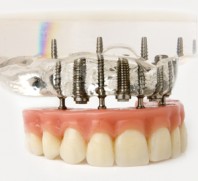Dental Implant Complications
“Dental Implant complications can create a serious situation that results in the implant being rejected by the jawbone.”
Dental Implant Problems
Dental implant complications following to implant surgery is very possible as with any other type of surgical procedure. Most of these problems can be cured without causing any major tooth damage, but in some instances, there is the risk of dental implant failure. The keys to reducing the risk of a dental implant falure are:
- Choosing an experienced implant dentist.
- Having an effective pre-operative treatment plan.
- Proper after-care and good oral hygiene are critical.
- Make sure to be infection free prior to implant surgery
The most common complications
Inflammation
When improper placement or incorrect size of the abutment and crown restoration happens, inflammation can occur. This puts under pressure and traumatizes the soft tissues around or beneath it. Dental implant inflammation causes a response from the body’s immune system that attacks the infected gingival and bone cells.
Rejection
Rejection can occur because the implant is a foreign object entering your body’s system. Sometimes the rejection happens with a sensitive system, and may be very difficult to continue the implant procedure. Rejection can also occur with other surgeries, such as a kidney or liver transplant.
Infection
Infection of the area surrounding the implant is one of, if not the most common dental implant complication. Implant infection, also known as peri-implantitis, presents as swelling of tissue around the implantation area. Peri-implantitis is a periodontal disease, and if it is not treated properly it can lead to implant failure, inflammation, or bone loss. Implant infection is typically caused by bacteria that are present during or immediately following surgery, and it is also possible that implant infection can present months or even years following the surgery.
Dental Implant Overload
Dental implant overload (think, too much weight on a tire) is caused when more than one tooth is replaced in one implant. This can put an excess amount of pressure on the bone supporting the implant. After a dental implant procedure, it is very important that the implant does not face too much biting pressure. The bone needs time to heal in order to withstand the pressure and to build up strength.
Failure
When the metal implant bends or breaks, it is a dental implant failure, which can lead to many complications, so dental implant failure needs to be addressed immediately. However, with the advances in modern technology, the possibility of this occurring is very low.
Bone Loss
There are several explanations why a dental implant experiences bone loss. If the gums surrounding a dental implant are not kept clean, the gums can become inflamed and this inflammation can extend into the supporting bone and endanger the dental implant. If a dental implant is overloaded, this can cause loss of the bone surrounding the dental implant. In many cases bone loss around a dental implant can be fixed with bone grafting after the original reason for the bone loss is successfully treated by the dentist.
Restorative Dentistry
Has many methods to return a perfect simile back to a patient. Understand dental implant complications is just part of being an informed patient.
by SSI VA
Categories
Recent Posts
-

Dental Implants
Dec, 30, 2015
-
General Dental Crowns
Dec, 30, 2015
-
Terms & Conditions
May, 26, 2015
-
Payment & Privacy Terms
May, 26, 2015
-
Dental Surgery
May, 26, 2015
-
Orthopedic & General Surgery:
May, 26, 2015
-
Eye Surgery
May, 26, 2015
-
Plastic Surgery:
May, 26, 2015
-
Site Map
May, 26, 2015
-
Links
May, 26, 2015













Leave a Comment